A mutual non-disclosure agreement (NDA), also known as a mutual confidentiality agreement, is a legal agreement between two or more parties who anticipate sharing confidential information between them and would like to limit each Party from sharing the information with other parties.
A mutual non-disclosure agreement can be used when two companies or organizations are looking to work together on a project. In which they may have to disclose confidential information that they may have to use to make the project a success.
Free Templates
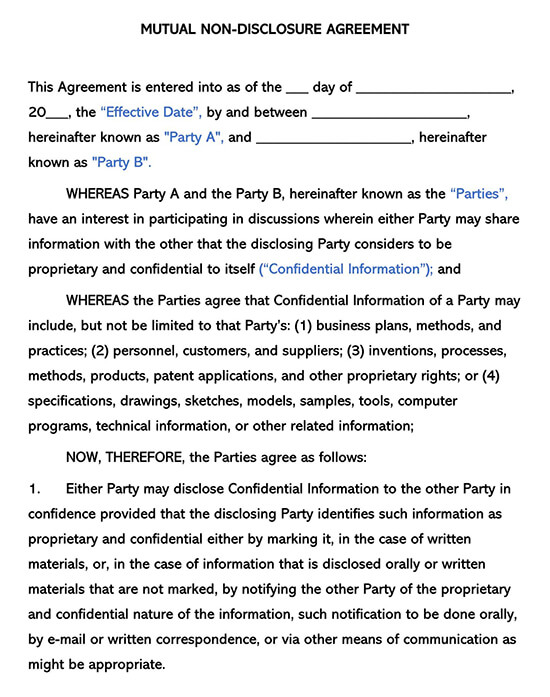
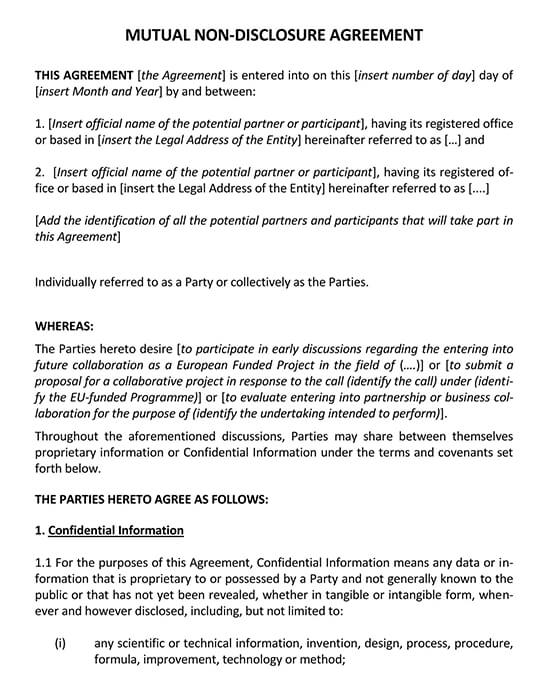
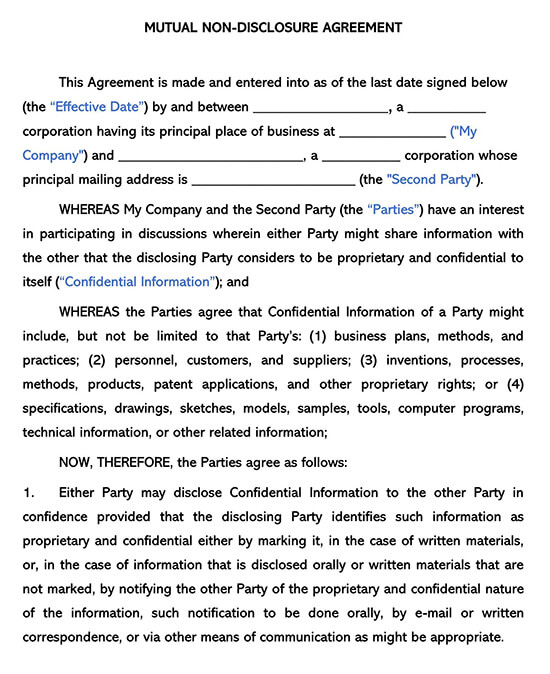
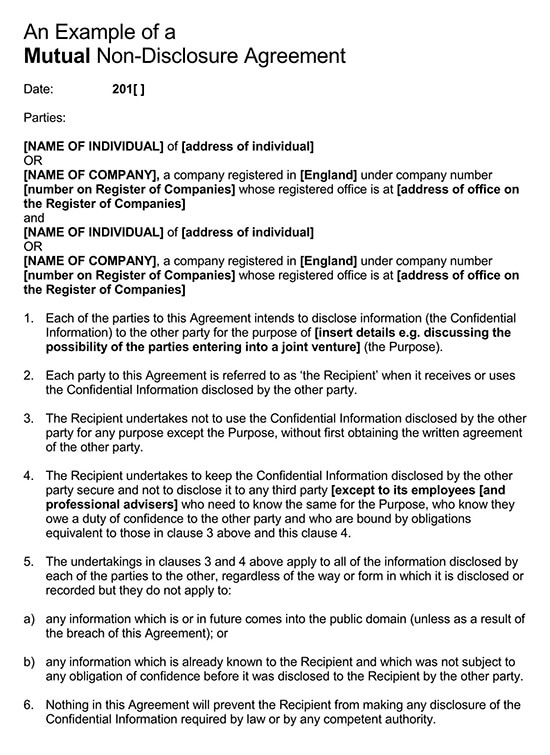
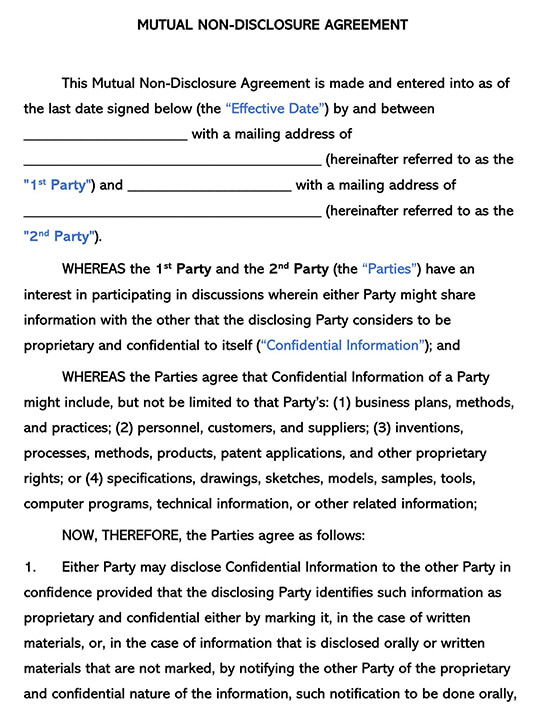
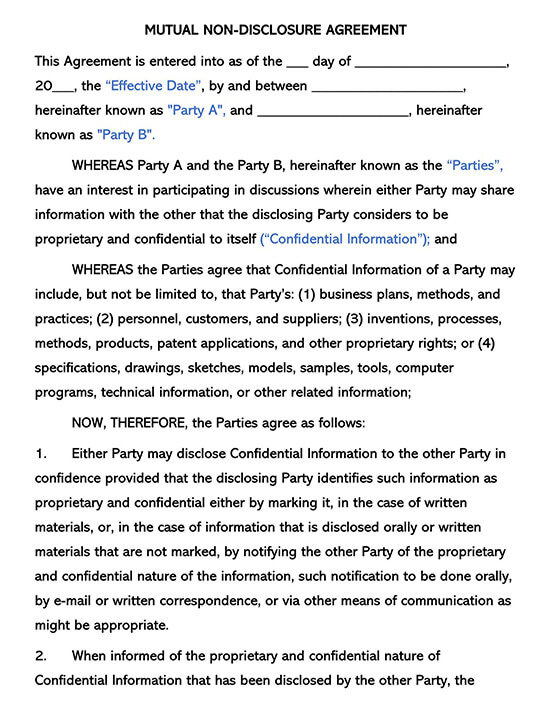
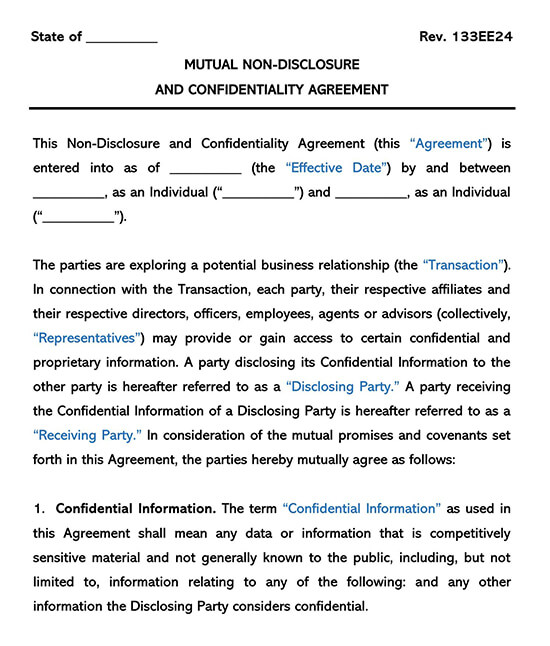
Differences Between a Mutual and Unilateral NDA
A unilateral NDA is a one-way agreement in which the Disclosing Party shares information with the Recipient. The Recipient signs the Agreement to acknowledge that they would not share the information with any other parties not included in the Agreement. In a unilateral non-disclosure agreement, only the Recipient of the Information acknowledges that they will not disclose the information.
On the contrary, in a Mutual non-disclosure agreement, both parties sign the Agreement to acknowledge that they will not share any information obtained during the term of their relationship as enshrined in the Agreement.
Mutual Non-Disclosure Agreement: When do you need it?
The main reason why most people would require you to sign an NDA is when they have proprietary or Confidential Information that they would like to share with you while ensuring that it does not fall into the public domain.
As a business, you must always protect any information that is of economic value to you. You may consider using the mutual agreement when venturing into a partnership with a new company and would like both parties to retain the integrity of the information they obtain in the process.
Common Uses of a Mutual Confidentiality Agreement
A mutual non-disclosure agreement provided a conducive environment for both parties to share any proprietary or Confidential Information.
The common uses of the agreement include:
- Mergers: when discussing whether a merger would be an excellent idea for the companies, a mutual NDA is a superb way of ensuring that while discussing at length the details of the merger, should the merger fail to happen, the information disclosed will remain confidential.
- Investor Relationships: when a small business is looking to partner with large companies to invest in their products, the agreement is essential.
- Partnerships: when entering into a partnership relationship with another business, it is always important to enter into this agreement. It will cushion any confidential information provided should the partnership fail to work.
How Will I Know If I Need a Mutual Confidentiality Agreement?
In some situations, you may not deem it fit to use a mutual confidentiality agreement in some; however, you may be stuck on deciding whether it is the right option to use.
If you are not entirely sure about whether to use it or not, you should try asking yourself these three simple questions:
- Do you trust the other Party will not disclose the information to your competitors at a later date and time?
- How comfortable are you disclosing the information to the other Party, and will they not use it to hurt your business in any way?
- Will releasing any information to your current employee or partner cause your business harm if they disclose the information outside the company?
If at all the answer to any of these questions is a “yes,” then we recommend you develop a mutual confidentiality agreement to ensure that all parties involved are limited to how and when they may share any proprietary or confidential information.
The Consequences of Not having a Mutual NDA
Sensitive business information should always be protected. Confidential information like trade secrets gives you a competitive advantage. It should ever be granted limited access as their misuse may result in enormous damages for the business.
Here are some negative consequences that may result from not using a mutual non-disclosure agreement:
Theft of ideas
This is perhaps the most significant consequence that may result from not using the correct agreement. The greatest asset for any upcoming or already established business is its ideas and inventions. Discussing your ideas with other companies without having the proper NDA may just be like throwing your ideas into the wind. There is no assurance that the business will not use the idea or invention you have pitched them as they may have all the necessary resources to bring similar products into the market faster.
Breeds mistrust
You ought to be very careful with any confidential information. To remove mistrust amongst both parties, you should use a mutual non-disclosure agreement. By signing the Agreement, both parties will feel free to share any information knowing that they are protected by the same parameters.
Negative publicity
Before disclosing any Confidential Information, you must ensure that if it is sensitive enough to damage your company’s reputation, you enter into the agreement before revealing it.
What Should be Included in Agreement?
Eight key components should be included in any Non-disclosure agreement, no matter the specific circumstances.
These include:
- The effective date– You should include the period for which the Agreement goes into effect officially. This may not always be the same day as the agreement is signed, so you should make sure to indicate it clearly in the Agreement.
- The period of the agreement-This indicates the period in which the Agreement will remain in effect. The period can be definite, while for some agreement, the period may be indefinite depending on the type of information to be disclosed by both parties.
- What should be protected-Indicate in detail what is to be covered in the Agreement. List the owner of the Confidential Information. This part should be very detailed to cover any loopholes that may be explored by either Party should they want to exploit your information.
- What happens if the agreement is broken-You must include a clause that will allow you to get an injunction order should the Agreement be broken. You should also include a phrase that will enable the disclosing Party to sue for damages caused as a result of a breach into the Agreement.
- What is meant by confidential-You should outline in detail what is meant by Confidential Information to avoid any problems that may arise should either Party fail to comply with the rules and regulations of the Agreement, and the “confidential” clause is put into interpretation by the court.
- Who information can be disclosed to-When entering into the agreement, for instance, if it is a partnership relationship, then you should clearly define the parties that will be allowed access to the information if it will aid them in ensuring that the objective for such a relationship is met.
- Use of Confidential Information-You should define in detail how both parties will be allowed to use any confidential information obtained during and after the Agreement is signed.
- How will the information be destroyed/returned? You should anticipate a time when you will need to destroy the information to better protect your company in the long run.
You must also consider the various ways in which the information will be returned to the other party if the information becomes void or if it becomes obsolete to the business.
Sample Mutual Non-Disclosure Agreement
sample
This Mutual non-disclosure agreement (the “Agreement”) is entered into by and between_______________, herein known as “Party A,” and ____ herein known as “Party B” together referred to as the “Parties” for the purpose of_________________ [insert details e.g. discussing the prospect of parties entering into a joint venture](the purpose). Either party, for the purposes of this Agreement, shall, depending on whether they are receiving or disclosing any Confidential Information be referred to as either the “Receiving party” or “Disclosing Party” respectively.
i. Definition of Confidential Information
For the purposes of this Agreement, “Confidential Information” shall include all information and/or material that has economic value or other utility in the business in which Party A or Party B is engaged. If either Party discloses the “Confidential Information” in writing, that Party shall, in writing, highlight or stamp the provisions with the word “Confidential” or use any similar warnings. Whereas, if the “confidential Information” is transmitted orally, the Party disclosing the information will also state in writing that such oral communications constituted Confidential Information.
ii. Exclusion from Confidential Information
Both Parties obligations with regards to this Agreement do not extend to information that is: (a) is already known to the public at the time of disclosure or through no fault of either Party becomes publicly known; (b) previously known by the other Party before signing this Agreement; (c); learned by either Party (Receiving Party) through other legitimate means other than the disclosing Party; (d) is disclosed to either Party before any written approval.
iii. Obligations of Receiving Party
The Receiving Party in this Agreement shall uphold at all times the confidentiality of the information for the sole exclusive benefit of the Disclosing Party. The Receiving Party in this Agreement shall only share the Confidential Information obtained through this Agreement only upon approval by the Disclosing Party and shall not for their own benefit publish, replicate, or permit the use of this Confidential Information by others for their benefit or to the detriment of the Disclosing Party. Any Confidential Information obtained through this Agreement shall, upon request in writing by the Disclosing Party, be returned to them immediately.
iv. Periods
This Agreement shall remain effective until_____________ unless: (a) The Disclosing Party sends in writing, a notice to the Receiving Party, releasing it from this Agreement, or (b) the Confidential Information set to be protected in through this Agreement ceases to be Confidential.
v. Relationships
This Agreement shall not be deemed to institute either Party, a partner, joint venture, or employee of either Party for any purpose thereof.
vi. Severability
Should any part of this Agreement be deemed invalid or enforceable by the court, that part shall be aside, and the rest of this Agreement shall be interpreted to affect the intent of the parties involved.
vii. Integration
Both Parties acknowledge that (a) they completely understand all the terms and conditions set with regards to the Agreement. (b) This Agreement supersedes all prior proposals, agreements, representations, and understandings. (c) This Agreement shall not be amended after it has been executed and shall only be amended in upon written consent from both parties.
viii. Waiver
Failure to implement any rights provided in this Agreement shall not in any way be a waiver of any prior or subsequent rights.
ix. Successor and Assigns
If either Party is acquired by another party either included in this Agreement or not shall be bound to this Agreement.
x. Signature
Both Parties in this Agreement agree through its authorized representatives to enter into this Agreement upon signing.
Signature (Party A)___________
Name___________
Date___________
Signature (Party B)___________
Name___________
Date___________
Frequently Asked Questions
Although it is not mandatory to involve legal counsel when creating a mutual non-disclosure agreement, it is, however, essential to engage a lawyer to help you draw a good NDA to help seal all loopholes that may arise when you form the Agreement individually.
The lawyer will also provide you the necessary details you need and will advise you on the best options to explore when formulating the NDA
Mutual non-disclosure agreements are pretty compelling. It ensures both parties are held accountable in the event of a loss resulting from the disclosure of the Confidential Information. A court may offer injunctions or compensation of some sought to result from the breach in the Agreement.












